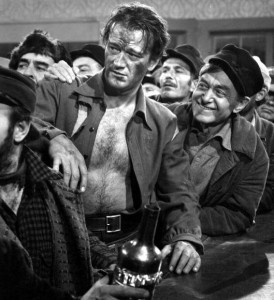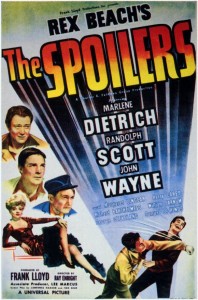 Produced by Universal, Ray Enrights’s film was the fourth screen version of Rex Reach’s 1906 novel of the same title. It was the second of three films that John Wayne made with Marlene Dietrich; the other two were Seven Sinners and Pittsburgh.
Produced by Universal, Ray Enrights’s film was the fourth screen version of Rex Reach’s 1906 novel of the same title. It was the second of three films that John Wayne made with Marlene Dietrich; the other two were Seven Sinners and Pittsburgh.
Dietrich’s stardom was then in decline due to the closing of the European movie markets during WWII. Aware of her German origins and still heavy accent, the producers tried to minimize the “foreign” aspect of Dietrich’s screen image, which put her on the map in the first place in the 1930s.
Indeed, Universal went out of its way to “Americanize” the screen image of Dietrich, who was always more popular in Europe than in the U.S.
The spoilers are a group of villains in the gold-mining boom at Nome, Alaska, at the turn of the century, led by Alexander McNamara (Randolph Scott), Nome’s new and corrupt gold commissioner.
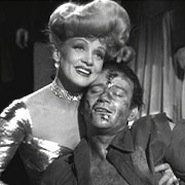 Cherry Malotte (Dietrich) is in love with Roy Glennister (Wayne), the co-owner of a gold mine along with partner Dextry (Harry Carey Sr.). Blinded by his attraction for Helen Chester (Margaret Lindsay), Roy somehow allows her uncle, Judge Stillman (Samuel S. Hinds), to double-cross him in a case that would determine the fate of the mine.
Cherry Malotte (Dietrich) is in love with Roy Glennister (Wayne), the co-owner of a gold mine along with partner Dextry (Harry Carey Sr.). Blinded by his attraction for Helen Chester (Margaret Lindsay), Roy somehow allows her uncle, Judge Stillman (Samuel S. Hinds), to double-cross him in a case that would determine the fate of the mine.
When the marshal is killed, the new gold commissioner Alexander McNamara (Randolph Scott) unjustly jails Roy. Cherry then gets a confession from Helen that she, Stillman and McNamara are involved in a conspiracy to rob the miners.
Roy escapes from jail and with his partner Dextry opens the mine that’s been guarded by McNamara’s men. Later on, Roy returns to town, kills Stillman, and then beats McNamara in a no-holds-barred fistfight. Significantly, in their confrontation, at Cherry’s home, when McNamara says, “I haven’t got a gun on me,” Wayne’s Glenninster says, “No? Then we’ll do it the hard way,” before using his fists and engaging in mano a mano.
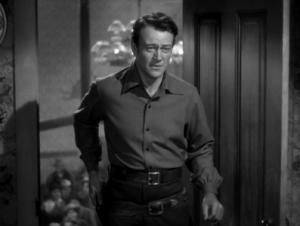 Though no mention is made of her character’s origins, Dietrich still maintains her heavy German accent and screen image, again playing a tough, self-assured, independent woman, who feels at home in the company of tough men, but who knows the right man when she see him. “No one else will do,” she tells her friend Bronco (Richard Barthelmess) about Wayne, but, as noted, Wayne doesn’t succumb easily to her charm.
Though no mention is made of her character’s origins, Dietrich still maintains her heavy German accent and screen image, again playing a tough, self-assured, independent woman, who feels at home in the company of tough men, but who knows the right man when she see him. “No one else will do,” she tells her friend Bronco (Richard Barthelmess) about Wayne, but, as noted, Wayne doesn’t succumb easily to her charm.
In one scene, she is seen collecting together some of the hard-boiled eggs that are Roy’s weakness, waiting in her room for him to return from business in Seattle; then, rather anxiously, she decided to greet him in person. But Roy doesn’t reciprocate, not immediately, that is. Treating her frivolously, he calls her “sport,” and makes sure to indicate that he is not ready to settle down with one woman.
We know it’s only a matter of time before Roy changes his mind about Helen, a kind, gentle, well-bred but dull and bland woman, compared to Cherry.
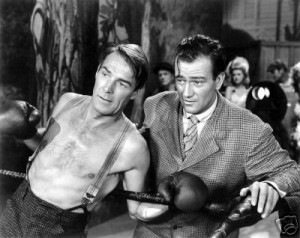 The Spoilers may be the only Wayne film in which his character is called “weak sister,” by his feuding partner no less. The movie is also remembered for containing Wayne’s best on-screen battle–rapid, slick, and well-choreographed, almost matching the fight between William Farnum and Ton Santschi in the silent version of 1914. In the 1942 version, Eddie Parker and Alan Pomeroy, stunt-doubled for Wayne and Scott, respectively.
The Spoilers may be the only Wayne film in which his character is called “weak sister,” by his feuding partner no less. The movie is also remembered for containing Wayne’s best on-screen battle–rapid, slick, and well-choreographed, almost matching the fight between William Farnum and Ton Santschi in the silent version of 1914. In the 1942 version, Eddie Parker and Alan Pomeroy, stunt-doubled for Wayne and Scott, respectively.
Oscar Alert
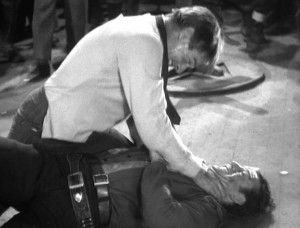 The Spoilers was nominated for the Black-and-White Interior Decoration, by John B. Goodman and Jack Otterson (art direction); Russell A. Gausman and Edward R. Robinson, set decoration. The winner, however was “This Above All.”
The Spoilers was nominated for the Black-and-White Interior Decoration, by John B. Goodman and Jack Otterson (art direction); Russell A. Gausman and Edward R. Robinson, set decoration. The winner, however was “This Above All.”
Cast
Cherry (Marlene Dietrich)
Roy Glennister (John Wayne)
Alexander McNamara (Randolph Scott)
Helen (Margaret Lindsay)
Dextry (Harry Carey Sr.)
Bronco (Richard Barthelmess)
Credits
Running time: 84 minutes
Release date: April 13, 1942
Produced by Frank Lloyd
Directed by Ray Enright
Screenplay: Lawrence Hazard and Tom Reed, based on the novel by Rex Beach
Camera: Milton Krasner
Art direction: Jack Otterson and John B. Goodman
Music: Frank Skinner
Music Director: Charles Previn
